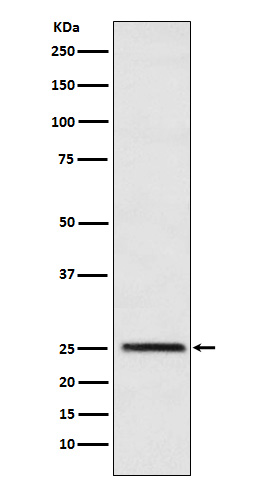
| WB | 咨询技术 | Human,Mouse,Rat |
| IF | 咨询技术 | Human,Mouse,Rat |
| IHC | 咨询技术 | Human,Mouse,Rat |
| ICC | 技术咨询 | Human,Mouse,Rat |
| FCM | 1/20-1/100 | Human,Mouse,Rat |
| Elisa | 咨询技术 | Human,Mouse,Rat |
| Aliases | HEL-S-49; TIM; TPI1; TPID;;TIM |
| WB Predicted band size | Calculated MW: 27 kDa ; Observed MW: 25 kDa |
| Host/Isotype | Rabbit IgG |
| Antibody Type | Primary antibody |
| Storage | Store at 4°C short term. Aliquot and store at -20°C long term. Avoid freeze/thaw cycles. |
| Species Reactivity | Human,Mouse,Rat |
| Immunogen | A synthesized peptide derived from human TIM |
| Formulation | Purified antibody in PBS with 0.05% sodium azide,0.05% BSA and 50% glycerol. |
+ +
以下是3篇与Triosephosphate isomerase(TPI)抗体相关的参考文献示例(注:内容为概括性描述,建议通过学术数据库核实原文):
1. **文献名称**: *Autoantibodies to triosephosphate isomerase in patients with chronic hepatitis C virus infection*
**作者**: Rigopoulou EI 等
**摘要**: 研究报道了慢性丙型肝炎患者血清中TPI自身抗体的存在,揭示了其与肝细胞损伤的潜在关联,提示TPI可能成为病毒性肝炎的自身抗原标志物。
2. **文献名称**: *Triosephosphate isomerase deficiency: insights into antibody-based diagnostic approaches*
**作者**: Schneider A 等
**摘要**: 探讨了TPI缺乏症中特异性抗体的开发和应用,通过ELISA和Western blot验证抗体对突变TPI蛋白的识别能力,为遗传性酶缺陷疾病的诊断提供新策略。
3. **文献名称**: *Immunohistochemical localization of triosephosphate isomerase in Alzheimer's disease brain tissues*
**作者**: Kim SH 等
**摘要**: 利用TPI特异性抗体进行脑组织免疫组化分析,发现阿尔茨海默病患者脑内TPI表达异常,可能与能量代谢障碍及淀粉样蛋白沉积相关。
4. **文献名称**: *Monoclonal antibody production against recombinant triosephosphate isomerase of Trypanosoma cruzi*
**作者**: Gómez EA 等
**摘要**: 描述了针对克氏锥虫TPI的单克隆抗体制备过程,验证其在高特异性检测寄生虫源性TPI中的应用,为热带病诊断工具开发提供基础。
**建议**:可通过PubMed或Google Scholar以关键词“triosephosphate isomerase antibody”、“TPI1 autoantibody”检索最新文献,并优先选择近五年内发表的实验性研究。
Triosephosphate isomerase (TIM) antibodies are immunological tools targeting the enzyme triosephosphate isomerase, a crucial glycolytic protein responsible for catalyzing the reversible interconversion of dihydroxyacetone phosphate (DHAP) and glyceraldehyde-3-phosphate (G3P). This enzyme plays a central role in energy production, making it essential in all living organisms. Structurally, TIM exists as a homodimer with highly conserved sequences across species, which facilitates its study using antibodies in diverse biological models.
TIM antibodies are widely employed in research to investigate metabolic pathways, cellular stress responses, and diseases linked to TIM dysfunction. For instance, TIM deficiency in humans is associated with hemolytic anemia and neurological disorders. Additionally, TIM overexpression has been implicated in cancer progression, where it supports tumor cell proliferation via enhanced glycolysis. Antibodies against TIM enable detection of its expression levels in tissues or cell lysates using techniques like Western blotting, immunohistochemistry, or immunofluorescence.
In autoimmune contexts, TIM autoantibodies have been identified in conditions such as systemic lupus erythematosus (SLE), suggesting its potential role as an autoantigen. Researchers also explore TIM antibodies to develop diagnostic assays or therapeutic strategies targeting metabolic vulnerabilities in diseases. Their cross-reactivity with TIM orthologs in pathogens (e.g., parasites, bacteria) further expands applications in infectious disease studies. Overall, TIM antibodies serve as vital reagents for elucidating metabolic regulation and disease mechanisms.
×